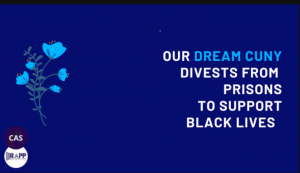
Anyone who has sat at a desk at Hunter College or disinfected their hands with sanitizer from New York State Clean has unknowingly benefited from the forced labor of someone who has been stolen from our society, said Diana Kennedy, a Hunter student advocate and co-creator of CUNY for Abolition and Safety.
Late on Wednesday morning, 99 people joined the virtual press conference held via Zoom by CUNY for Abolition and Safety and the Release Aging People in Prison Campaign to demand CUNY divest from the “prison industrial complex” and that Cuomo release elders from prison.
After the killing of George Floyd and the rise of the Black Lives Matter Movement, members of the two campaigns wrote an open letter to the CUNY administration demanding they cut ties with the police and Corcraft — a state manufacturer that utilizes prison labor. The letter, which over 90 students, faculty members, community organizations and elected officials signed, was sent out shortly after the press conference.
Besides their purchasing contract with Corcraft, CUNY invests in several corporations embedded in the country’s prison system, like Aramark–a service that provides food, facilities and uniforms to incarcerated people and facility management to U.S. Immigration and Customs Enforcement and Border Control, said Kennedy.
CAS is not the first group to petition CUNY’s relationship with the industrial prison system. In 2012, the CUNY Prison Divest was founded by Hunter and Brooklyn College students, inspired by their peers at Columbia University who were demanding the same of their school.
“I worked in Corcraft for years while incarcerated, and the reason why they can hold us is because of the Thirteenth Amendment,” said Egypt Dior, a law student who recently finished parole after serving 20 plus years in prison. “Looking at the Thirteenth Amendment, it clearly shows you that it does not apply to the melanated person. It says they can punish you and make you become a slave if they’re able to prosecute you. When we’re talking about killing the system, the Constitution’s got to be attacked head-on first.”
Eleven other advocates participated in the event, remarking on their personal experiences with both CUNY and the prison system. Two speakers, Mark Shervington, the NYC organizer of the Release Aging People in Prison Campaign, and Nawanna Snipe Tucker, the community leader of the same group, shared information about the Fair and Timely Parole Act and the Elder Parole Act, which are fighting to return elders to their communities and combat the genocidal aims of the industrial prison company.
“RAP has sought to get relief for those incarcerated in various ways, including a massive clemency campaign,” said Shervington. Their solutions are to save lives, reunite families, promote racial justice, and save the state tens of millions of dollars through their two proposed acts. The Elder Parole Act will allow hearings before the Parole Board for incarcerated people 55 years or older who have already served 15 plus years. The Fair and Timely Parole Act will provide more meaningful parole reviews for incarcerated people already eligible.
“I know the importance of the legislature and policies that can be implemented, but also the importance of students making their voices heard,” said Juvanie Piquant, the chairwoman of University Student Senates and only student sitting on the County Board of Trustees. “CUNY has a part in perpetuating dehumanizing individuals.”
Speakers also mentioned the 100,000 gallons of hand sanitizer Governor Cuomo boasted about in his news conferences at the start of the pandemic and how that sanitizer was created by the slave labor of incarcerated people who were denied proper health precautions and care from the coronavirus. CUNY and other higher education institutions have a role in dismantling systematic oppression and systematic racism.
CUNY did not respond to comment in time for the article’s publication. Hunter College has made no public statements about its involvement with the private prison industry but lists Corcraft as one of their preferred suppliers.
“It starts with our university,” Piquant said. “It’s not going to happen tomorrow, it’s not going to happen this summer, but it will happen one day and we all have to believe in that.”
Representatives of The Forward Coalition and Bring Mumia Home also spoke at the conference.
